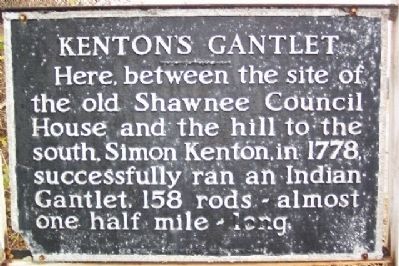What I did not know and never thought about much was where the name came from. Like the name Cincinnati, I assumed it was a nod to the Roman era. The billboards for the flea market seem to emphasize that angle too. It turns out the billboards aren't exactly historically accurate and as usual, there is more to the story.
The name comes from an escaped or possibly captured black slave named Caesar who was adopted by the Shawnee, a fairly common American Indian practice in those days. Sometimes these adoptees escaped but many they stayed with their new Indian families. Caesar stayed, preferring this new life to his old one. I'll bet that wasn't a hard decision for him. He was eventually given his own hunting land by the local Chief. I wish there was more information on Caesar himself but his significant place in history was recalled by the famed frontiersman Simon Kenton who owed him his life...
 |
| marker near Xenia OH has been stolen |
During his captivity, Caesar, now a full member of the Shawnee, took some pity on Simon who was barely clinging to life from his ordeal. Caesar could not offer direct assistance or face punishment himself, but he did give him information on how to escape if given the chance. By following the creek on his hunting land he named for himself...Caesars Creek, to the Little Miami and then to the Ohio River, a trip of at least 60 miles, he could then reach the safety of the settlements in Kentucky.
Simon Kenton never got to use the advice from Caesar but his words gave him hope when all hope seemed lost. He finally did escape in 1779 during a stop at the British Fort Detroit and made it back to American settlements thereby securing his status as a living legend, feared and respected by whites and Indians alike. But this post is really about Caesar. You can look forward to a full Gehio post about Simon Kenton one day!
 |
| Simon Kenton (1755 - 1836) in Covington KY |
No one knows what happened to Caesar, but without his encouragement, Kenton would surely have perished or been forgotten himself and changed American history.

No comments:
Post a Comment